Related Research Articles

The flags of the Confederate States of America have a history of three successive designs during the American Civil War. The flags were known as the "Stars and Bars", used from 1861 to 1863; the "Stainless Banner", used from 1863 to 1865; and the "Blood-Stained Banner", used in 1865 shortly before the Confederacy's dissolution. A rejected national flag design was also used as a battle flag by the Confederate Army and featured in the "Stainless Banner" and "Blood-Stained Banner" designs. Although this design was never a national flag, it is the most commonly recognized symbol of the Confederacy.
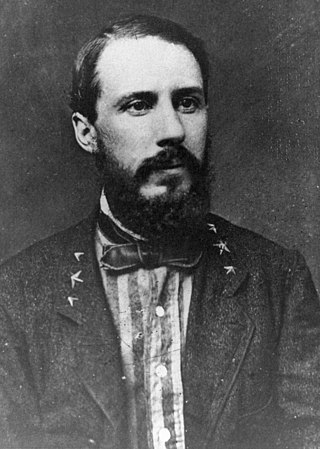
Edward Porter Alexander was an American military engineer, railroad executive, planter, and author. He served first as an officer in the United States Army and later, during the American Civil War (1861–1865), in the Confederate Army, rising to the rank of brigadier general.

Alexander Hamilton Stephens was an American politician who served as the first and only vice president of the Confederate States from 1861 to 1865, and later as the 50th governor of Georgia from 1882 until his death in 1883. A member of the Democratic Party, he represented the state of Georgia in the United States House of Representatives before and after the Civil War.

Thomas Jordan was a Confederate general and major operative in the network of Confederate spies during the American Civil War. A career soldier in the armies of three nations, he had previously fought in the Mexican–American War, and in 1868 was appointed as chief of staff of the Cuban insurgent army, which fought to achieve independence from Spain. He resigned in 1870 and returned to the United States, where he settled in New York City. Jordan was also a newspaper editor and author, writing articles about the American Civil War.

Appletons' Cyclopædia of American Biography is a six-volume collection of biographies of notable people involved in the history of the New World. Published between 1887 and 1889, its unsigned articles were widely accepted as authoritative for several decades. Later the encyclopedia became notorious for including dozens of biographies of people who had never existed. In nearly all articles about the Cyclopædia various authors have erroneously spelled the title as 'Appleton's Cyclopædia of American Biography', placing the apostrophe in the wrong place.

The St. Marys River is a 126-mile-long (203 km) river in the southeastern United States. The river was known to the Timucua as Thlathlothlaguphka, or Phlaphlagaphgaw, meaning "rotten fish". French explorer Jean Ribault named the river the Seine when he encountered it in 1562. From near its source in the Okefenokee Swamp, to its mouth at the Atlantic Ocean, it forms a portion of the border between the U.S. states of Georgia and Florida. The river also serves as the southernmost point in the state of Georgia. The St. Marys River rises as a tiny stream, River Styx, flowing from the western edge of Trail Ridge, the geological relic of a barrier island/dune system, and into the southeastern Okefenokee Swamp. Arching to the northwest, it loses its channel within the swamp, then turns back to the southwest and reforms a stream, at which point it becomes the St. Marys River. Joined by another stream, Moccasin Creek, the river emerges from the Okefenokee Swamp at Baxter, Florida/Moniac, Georgia. It then flows south, then east, then north, then east-southeast intersecting I-95 near Yulee, and finally emptying its waters into the Atlantic, near St. Marys, Georgia and Fernandina Beach, Florida.
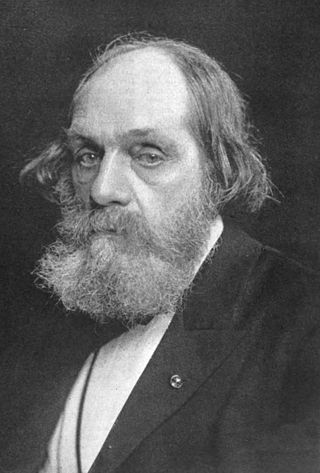
Edward Everett Hale was an American author, historian, and Unitarian minister, best known for his writings such as "The Man Without a Country", published in Atlantic Monthly, in support of the Union during the Civil War. He was the grand-nephew of Nathan Hale, the American spy during the Revolutionary War.

Stephen Dill Lee was an American officer in the Confederate Army, politician, and first president of Mississippi State University from 1880 to 1899. He served as lieutenant general of the Confederate States Army in the Eastern and Western theaters of the American Civil War.

John Clark Ridpath was an American educator, historian, and editor. His mother was a descendant of Samuel Matthews, a colonial governor of Virginia. Among his most notable works is a series of volumes on a history of the world, titled Cyclopedia of Universal History.
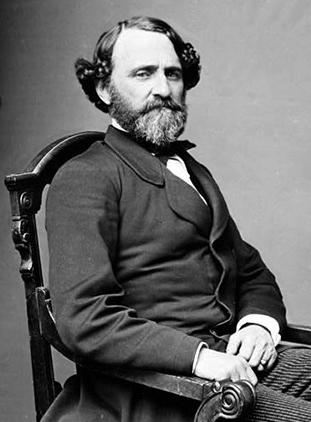
John Forsyth Jr. was an American newspaper editor of the Mobile Register and the son of politician John Forsyth.

The Okefenokee National Wildlife Refuge is a 402,000‑acre (1,627 km2) National Wildlife Refuge located in Charlton, Ware, and Clinch Counties of Georgia, and Baker County in Florida, United States. The refuge is administered from offices in Folkston, Georgia. The refuge was established in 1937 to protect a majority of the 438,000 acre (1,772 km2) Okefenokee Swamp. Though often translated as "land of trembling earth", the name "Okefenokee" is likely derived from Hitchiti oki fanôːki "bubbling water".

D. Appleton & Company was an American publishing company founded by Daniel Appleton, who opened a general store which included books. He published his first book in 1831. The company's publications gradually extended over the entire field of literature. It issued the works of contemporary scientists, including those of Herbert Spencer, John Tyndall, Thomas Huxley, Charles Darwin, and others, at reasonable prices. Medical books formed a special department, and books in the Spanish language for the South America market, including the works of Rafael Pombo, were a specialty which the firm made its own. In belles lettres and American history, it had a strong list of names among its authors. On June 2, 1933, D. Appleton & Company merged with The Century Company.
The Suwannee Canal was an attempt to drain large portions of the Okefenokee Swamp in Georgia via a canal. The spelling of the Suwannee River has changed over time. The single n variant was more common in the past, but the double n spelling is the standard today.
Cecile Hulse Matschat was an American geographer and botanist, known best as the author of books on gardens, gardening and the Okefenokee Swamp.

Martin Luther Smith was an American soldier and civil engineer, serving as a major general in the Confederate States Army. Smith was one of the few Northern-born generals to fight for the Confederacy, as he had served most of his early military career in the South with the United States Army's topographical engineers, marrying a native of Athens, Georgia. He planned and constructed the defenses of Vicksburg.

Samuel Fallows was an English American immigrant, minister, lecturer, and author. He was the 9th Superintendent of Public Instruction of Wisconsin and served as Presiding Bishop of the Reformed Episcopal Church for 30 years between 1877 and 1922. During the American Civil War he served as a chaplain and later as an officer in the Union Army, receiving an honorary brevet to Brigadier General after the war.

Arnold Elzey Jones Jr., known for much of his life simply as Arnold Elzey, was a soldier in both the United States Army and the Confederate Army, serving as a major general in the American Civil War. At First Manassas, he became one of the few officers ever to receive an on-the-field promotion to general by President Jefferson Davis. He commanded a brigade in Stonewall Jackson's Valley Campaign, and was badly wounded at Gaines Mill, ending his active field career.
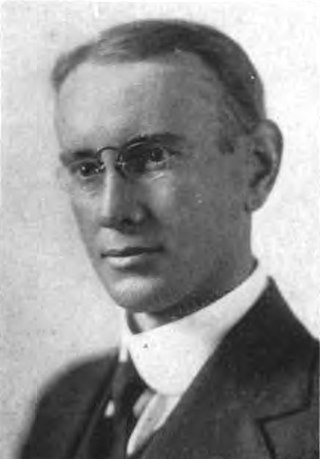
Albert Hazen Wright was an American herpetologist and professor at Cornell University. He was also an honorary member of the International Ornithological Congress. He did a great deal of study of the Okefenokee Swamp. In 1955 he won the Eminent Ecologist Award.
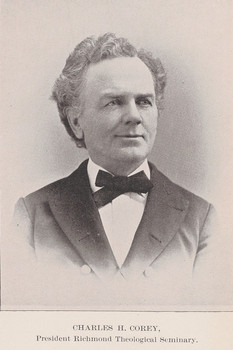
Charles Henry Corey (1834-1899), was a Canadian Baptist clergyman.

Alexander Hamilton Bowman was an engineer, military educator, and career officer in the United States Army. Bowman supervised the erection of Charleston Harbor defenses, including Fort Sumter, and served as Superintendent of the United States Military Academy at West Point, New York, during the American Civil War.
References
- ↑ Lynwood, Fleming, Walter. The South in the Building of the Nation: Biography K-Z. Pelican Publishing. ISBN 9781589809475 – via Google Books.
{{cite book}}: CS1 maint: multiple names: authors list (link) - ↑ "Louis Pendleton (1861-1939). Ayres, ed. 1917. The Reader's Dictionary of Authors". www.bartleby.com.
- 1 2 Mrs. Katherine Cox Gottschalk; John Bailey Calvert Nicklin (1932). "The Pendleton Family". The Virginia Magazine of History and Biography. 40 (2): 179–186. JSTOR 4244453 – via JSTOR.
- 1 2 3 "Obituary for Louis Beauregard Pendleton (Aged 78)". May 14, 1939. p. 4 – via newspapers.com.
- ↑ "Pendleton, Louis Beauregard, Author - North Carolina Literary Map". libapps4.uncg.edu.
- ↑ "In the Okefenokee; a story of war time and the great Georgia swamp. By Louis Pendleton - Digital Library of Georgia". dlg.usg.edu.
- ↑ "Pendleton, Louis Beauregard". Archived from the original on 2021-08-07. Retrieved 2021-08-07.
- ↑ Pendleton, Louis Beauregard (July 12, 2010). Alexander H. Stephens. BiblioBazaar. ISBN 9781176172425 – via Google Books.